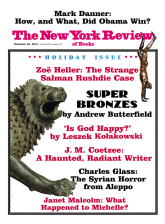When Anis Rushdie read his son’s novel Midnight’s Children for the first time in 1980, he became convinced that Ahmed Sinai, the drunken father in the book, was a satirical portrait of himself. A family row ensued. Rushdie fils did not deny that Sinai was based on his father—“In my young, pissed-off way,” he would later tell The Paris Review, “I responded that I’d left all the nasty stuff out”—but he objected to his father’s wounded reaction and thought it revealed a crude understanding of how novels worked. “My father had studied literature at Cambridge so I expected him to have a sophisticated response to the book, but the person who did was my mother…. She understood it at once as fiction.”
The position that Rushdie took during this literary-domestic spat uncannily prefigured the position he would take nine years later, when confronted by the wrath of another, more punishing patriarch. On February 15, 1989, a day after the Ayatollah Khomeini had issued a fatwa condemning him to death for his authorship of The Satanic Verses, Rushdie appeared on British television and announced that he wished his book had been “more critical” of Islam. As he reports in Joseph Anton—a memoir he has chosen to write in a de Gaulle–like third person—his principal emotion at the time was one of bafflement:
When he was first accused of being offensive, he was genuinely perplexed. He thought he had made an artistic engagement with the phenomenon of revelation; an engagement from the point of view of an unbeliever, certainly, but a proper one nonetheless. How could that be thought offensive? The thin-skinned years of rage- defined identity politics that followed taught him, and everyone else, the answer to that question.
Given how often Rushdie has been accused of writing The Satanic Verses with the express purpose of making trouble, it is understandable that he should wish to highlight the unexpected—the unprecedented—nature of the events that followed the novel’s publication. Even so, his retrospective account of himself as a bookish innocent, bewildered by the world’s coarse intrusion into the literary sphere, seems a little over-egged. By this point in his career, Rushdie, who had already been sued by Indira Gandhi for libelous statements in Midnight’s Children and had already seen his third novel banned in Pakistan, was better qualified than most to appreciate literature’s capacity for eliciting hostile, nonliterary responses.
More troubling, however, than his exaggerated claim to naiveté is the case that Rushdie seems to be making for fiction’s immunity from political or religious anger. In a departure from the standard, liberal notion that literature must be free to offend, he proposes that literature, properly understood, cannot offend. Muslims who were insulted by The Satanic Verses were guilty of a category error: just like Anis Rushdie, in his “unsophisticated” reading of Midnight’s Children, they had confused fiction with other sorts of speech:
This Issue
December 20, 2012
Is God Happy?
The Quest for the Girl from Bendigo Street
-
1
Elsewhere, Rushdie has provided an alternative and rather more convincing account of what he understood about the provocative content of The Satanic Verses, prior to publication. In his 2005 interview with The Paris Review, he recalled, “I knew my work did not appeal to the likes of radical mullahs…. There were one or two early readers, including Edward Said, who noticed that I’d taken these guys on and asked whether I was concerned about it. And in those innocent days, I said no…. The idea that it would even float across their field of vision seemed improbable, and I truthfully didn’t care. Why shouldn’t literature provoke? It always has.” ↩
-
2
Interview with David Cronenberg, Shift, June/July 1995. ↩





